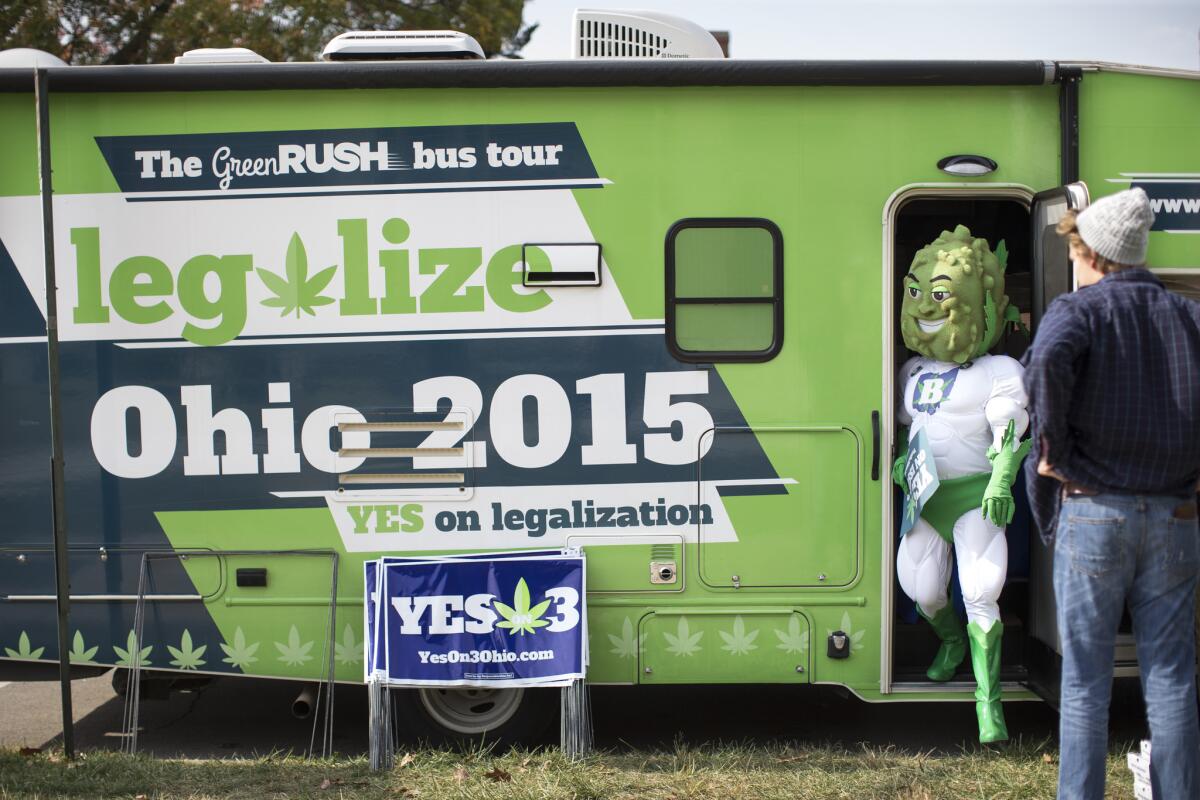Opinion: Ohio voters could legalize pot and the first marijuana ‘cartel’

Buddie, the mascot for the pro-marijuana legalization group ResponsibleOhio, steps out of a promotional tour bus at Miami University in Ohio.
- Share via
Ohio voters decide Tuesday whether theirs will be the fifth state in the nation to legalize recreational marijuana. But the ballot measure is generating more than the usual legalize-or-don’t-legalize debate, and it has divided the pro-legalization camp.
That’s because Issue 3, as the measure is called, would grant the landowners or operators of 10 predetermined sites the exclusive right to grow commercial marijuana. The measure essentially creates “a legal cartel for the cultivation of marijuana that could only be changed by a future vote of the people,” according to the Cleveland Plain Dealer’s editorial page, which opposes the measure. And guess who sponsored and bankrolled Issue 3? The investors who own and would operate the 10 would-be-legal pot farms, of course.
Backers of ResponsibleOhio stand to make a huge profit if Issue 3 is approved, and they’ve made no secret of that. But they note that past grassroots efforts to legalize marijuana -- medical or recreational -- have gone nowhere in the Republican-controlled state. It took moneyed investors and their profit motivation to get Issue 3 on the ballot. (One investor is Nick Lachey, who was a member of the boy band 98 degrees.)
Yet, the prospect of corporate cannabis and marijuana oligopolies has cost ResponsibleOhio some high-profile supporters, as well as many local proponents of legalization. The Marijuana Policy Project and the Drug Policy Alliance, which have both backed successful legalization ballot measures, are staying neutral on Issue 3.
Campaigns to end marijuana prohibition have typically talked about expanding personal freedom, allowing proper regulation and taxation of a widely-used but little controlled drug, and decriminalizing marijuana use in order to let police and prosecutors focus on serious and violent crime. Ohio’s Issue 3 would probably accomplish all of those goals, but there is an understandable discomfort in letting self-interested investors dictate a state’s marijuana policy. Will that be enough to deter Ohio voters?
So far, California is in the anti-corporatization camp. Laws passed this year to regulate the medical marijuana industry prohibit vertical integration of cannabis businesses. That is, the state will issue separate licenses for growing, processing, transporting and selling marijuana -- and one licensee can’t do it all. Law enforcement, some growers and public health advocates have also raised concerns about the corporatization of marijuana. Many want to limit the opportunity for marijuana businesses to concentrate wealth and power so they don’t become massive lobbying and marketing forces, like Big Tobacco or the alcohol industry, that aim to increase consumption to increase their profits.
Likewise, this summer a Blue Ribbon Commission on Marijuana Policy, put together by Lt. Gov. Gavin Newsom, said any effort to legalize marijuana should make sure large, corporate interests aren’t allowed to dominate the market.
And many of the big money backers supporting a 2016 ballot measure to legalize marijuana in California appear to be more philanthropic than profit-driven, with funders including Napster founder Sean Parker, Hyatt Hotel heirs Nick and Joby Pritzker, and Graham Boyd, who is connected to the heirs of the Progressive Insurance fortune, according to the San Francisco Chronicle.
Still, it’s worth watching what voters in Ohio decide. If they embrace corporate cannabis, will that encourage investors to sponsor ballot measures in other states? California, and the country, could get Big Weed after all.
For more opinions, follow me @kerrycavan on Twitter.
More to Read
A cure for the common opinion
Get thought-provoking perspectives with our weekly newsletter.
You may occasionally receive promotional content from the Los Angeles Times.











